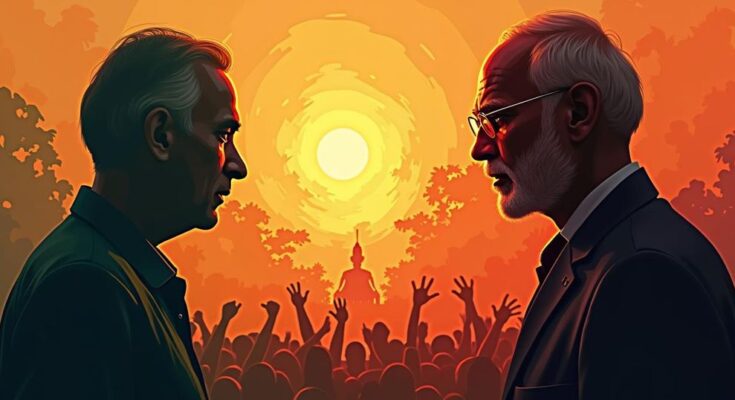Bangladesh’s interim government has recalled its high commissioner to India, Mostafizur Rahman, as a response to rising tensions following the political upheaval that ousted Prime Minister Sheikh Hasina. This move reflects a broader reorganization within the diplomatic corps amidst changing governance under caretaker leader Muhammad Yunus, potentially altering the long-standing ties with India and impacting diplomatic relations with various other countries.
The interim government of Bangladesh has officially recalled its high commissioner to India, Mostafizur Rahman, in a move interpreted as a reaction to recently heightened tensions between Dhaka and New Delhi. This decision follows closely on the heels of discussions held by Indian High Commissioner Pranay Verma with Md. Touhid Hossain, the Foreign Affairs Adviser to the Bangladeshi government, which aimed at nurturing bilateral relations. The recall symbolizes a critical juncture in the ongoing diplomatic saga between the two nations, particularly in light of the recent political upheaval in Bangladesh. Notably, the recall of Mr. Rahman is not an isolated incident; it is part of a broader reassessment of the country’s diplomatic representation. The Bangladeshi government has also withdrawn its top diplomats from various nations, including Australia, Belgium, Portugal, the United Kingdom, and the United Nations, indicating a comprehensive restructuring of its diplomatic ranks. This restructuring involves notable figures such as Muhammad Abdul Muhith, the nation’s Permanent Representative to the United Nations, as well as M Allama Siddiqui, the High Commissioner to Australia. The current political turmoil in Bangladesh ensued after the ousting of long-standing Prime Minister Sheikh Hasina, which has led to significant alterations in both domestic and foreign policy. Following a student-led uprising that compelled her to leave the country in August, Hasina’s resignation came just prior to her trip to India. The subsequent appointment of Nobel laureate Muhammad Yunus as caretaker leader heralds a pivotal shift in the governance paradigm of Bangladesh. The Cooling of India-Bangladesh Relations The removal of Sheikh Hasina from power, a leader known for fostering robust ties with India, has significantly cooled the diplomatic relations between Dhaka and New Delhi. During her administration, Hasina was lauded for her efforts to forge closer cooperation with India, particularly in crucial sectors like trade, defence, and infrastructure initiatives aimed at enhancing regional connectivity. However, her abrupt departure has precipitated unease in this partnership. Historically, India has nurtured close relations with various Bangladeshi governments, but under the stewardship of Yunus, there is a discernible shift in foreign policy approach. This recalibration is underscored by Bangladesh’s decision to redeploy key diplomats, prompting speculation regarding the future direction of the country’s international relations. The relationship became further strained as Hasina departed to Delhi soon after stepping down, which some in Dhaka interpreted as an implicit indication of Indian support for her regime. Such perceptions have stoked anti-India sentiment among certain segments of the population. The current leadership under Yunus seems to be adopting a more prudent stance, hinting at a potential recalibration of the bilateral relationship moving forward. Profile of Mostafizur Rahman Mostafizur Rahman, who took up his role as Bangladesh’s high commissioner to India in July 2022, played a pivotal role in nurturing the bilateral relationship. His tenure emphasized development cooperation and enhancing trade ties between the neighboring countries. An experienced diplomat, Rahman has previously served as Bangladesh’s permanent representative to the United Nations in Geneva, and held ambassadorial roles in Switzerland and Singapore. He holds a medical degree from Sir Salimullah Medical College in Dhaka, along with a Master’s degree in Public International Law from the University of London; Rahman also possesses a Post-Graduate Diploma from the International Institute of Public Administration (IIAP) in France. His recall signals the current government’s intent to recalibrate its international relations in light of the recent political transformations. Future Prospects for Bangladesh-India Relations The historical bonds between India and Bangladesh are rich in cultural, economic, and political dimensions. Nonetheless, the present turbulence poses fresh challenges. Under Hasina’s leadership, measures to bolster trade and address cross-border issues—ranging from terrorism to illegal immigration—had fostered a relatively stable diplomatic environment. However, it remains to be seen how the policies will evolve with Yunus in charge, highlighting a period of uncertainty in the future of Bangladesh-India relations.
The recent recall of Bangladesh’s high commissioner to India is a significant diplomatic decision reflecting the ongoing political turmoil in Bangladesh. The political landscape has shifted dramatically following the departure of Sheikh Hasina, a Prime Minister known for her alignment with India. The newly appointed caretaker leader, Muhammad Yunus, presents a different approach to foreign policy, calling into question the future dynamics of the relationship between the two nations. The recall of diplomats signifies not just a response to political tensions but also an attempt to redefine Bangladesh’s diplomatic stance on a wider scale, impacting its international relations with multiple countries.
In conclusion, the recall of Mostafizur Rahman and other diplomats represents a pivotal shift in Bangladesh’s foreign policy amidst the political instability following the ouster of Sheikh Hasina. The evolving leadership under Muhammad Yunus could herald a recalibration of relations with India and potentially reshape Bangladesh’s diplomatic engagements with other nations. As Bangladesh navigates this transitional phase, the broader implications for India-Bangladesh ties remain uncertain, necessitating close observation of future developments in this significant bilateral relationship.
Original Source: www.financialexpress.com




